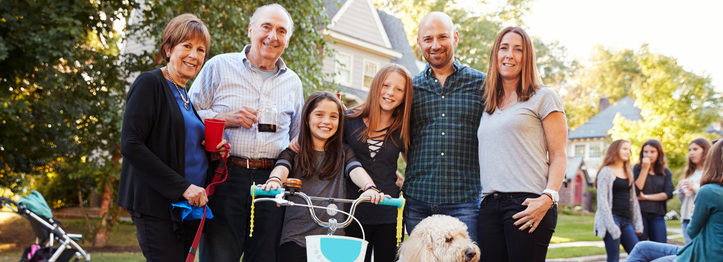
You’ve heard the statement “love your neighbor as yourself” hundreds of times before. And even if you don’t know where it comes from or who said it, the message is pretty clear. But what if we actually took this statement to heart and literally loved our physical neighbors – the folks on your street – as we loved ourselves? In short, it would transform our local neighborhoods and cities into loving communities – which is exactly what they were designed to be.
In the Bible, the primary commandment is to “love the Lord your God with all your heart and with all your soul and with all your mind and with all your strength.” The second most important commandment is to “love your neighbor as yourself.” In fact, Jesus even goes so far as to say, “No other commandment is greater than these.”
But you don’t have to be a Christian to feel the weight of these statements. Virtually any major religious text includes this commandment in some form or fashion – so much so that modern culture has created the “golden rule.” Few people, however, take this statement to heart.
The question is, what does it look like to actually love your neighbor as yourself? Well, for starters you have to learn to love yourself.
“What most of us fail to realize is that we are in constant relationship with ourselves,” Ariel Banayan writes for Habit Nest. “Unfortunately that relationship is usually characterized by constant judging of oneself, talking to oneself negatively, and putting all of our time and energy into what other people think about us.”
By learning to be less judgmental of your past and choosing optimism over everything else, you can create an internal posture that’s positive and loving. Eventually, this will spill over into how you interact with others – including your neighbors.
Another passage in the Bible – this one from 1 Corinthians 13 – explains exactly what love is: “Love is patient, love is kind. It does not envy, it does not boast, it is not proud. It does not dishonor others, it is not self-seeking, it is not easily angered, it keeps no record of wrongs. Love does not delight in evil but rejoices with the truth. It always protects, always trusts, always hopes, always perseveres.”
This is simple advice to read and write on a notecard, but it can feel overwhelming and unnatural to put into practice – especially when your neighbors drive you nuts. But until you try, you’ll never know what’s possible.
If you want a straightforward guide to what loving your neighbor looks like, 1 Corinthians 13 is where it starts. The problem is that we don’t always know what it looks like to apply these principles within the context of 2018, where there are HOAs, property line disputes, and gossipy homeowners.
We certainly don’t have all of the answers, but we do have some practical suggestions for you that we feel may have a transformational impact on the community where you live. Take a look:
For starters, you have to meet your neighbors. Waving when someone drives by or saying hello when you pass someone on a walk doesn’t count. You actually need to know names, what people do for a living, what interests they have, who their children are, etc. The easiest time to do this is right after you move in, but it’s never too late to go around and introduce yourself.
Nothing kills the love in a community quite like gossip. Yet, if you drive around to any neighborhood in your town, you’ll find people gossiping about one another and speaking into things that are of no concern to them.
You can’t control what other people do, but you can set a precedence by refusing to gossip in your neighborhood and politely calling others out when they do. Just say something like, “I don’t think we know the details of the situation, so we should reserve judging until we’re able to find out more.” That will stop most people in their tracks and help them reconsider how they talk about their neighbors.
Most American homes are designed in such a way that the backyard is the focal point of the property’s exterior. While there’s nothing wrong with this, it does tend to isolate you from the rest of the neighborhood.
One suggestion is to spend more time in your front yard, which allows you to interact with more people and strike up a conversation with your neighbors as they walk or drive by.
One of the nicest things you can do for a neighbor is to invite them into your home and share a meal with them. Once you feel like you’ve established a relationship with your neighbors, carve out some dates on the family calendar and have them over for dinner.
Are you familiar with the Ben Franklin Effect? It’s a psychological phenomenon by which you can actually force yourself to like someone more by doing something nice for them. In other words, if you have a neighbor that you don’t particularly care for, do something kind – such as mow their lawn or bring over cookies – and this simple act will actually make you feel more positive towards them (and should have a reciprocal effect as well).
When you’ve been involved in a community for more than 30 years, you feel a sense of connection and love that can only come with time, experience, and special relationships.
At Green Residential, the connection we share with Houston only gets stronger with each passing year. To learn about our property management services, as well as what it looks like to sell a home with a flat fee rate, please contact us today!
